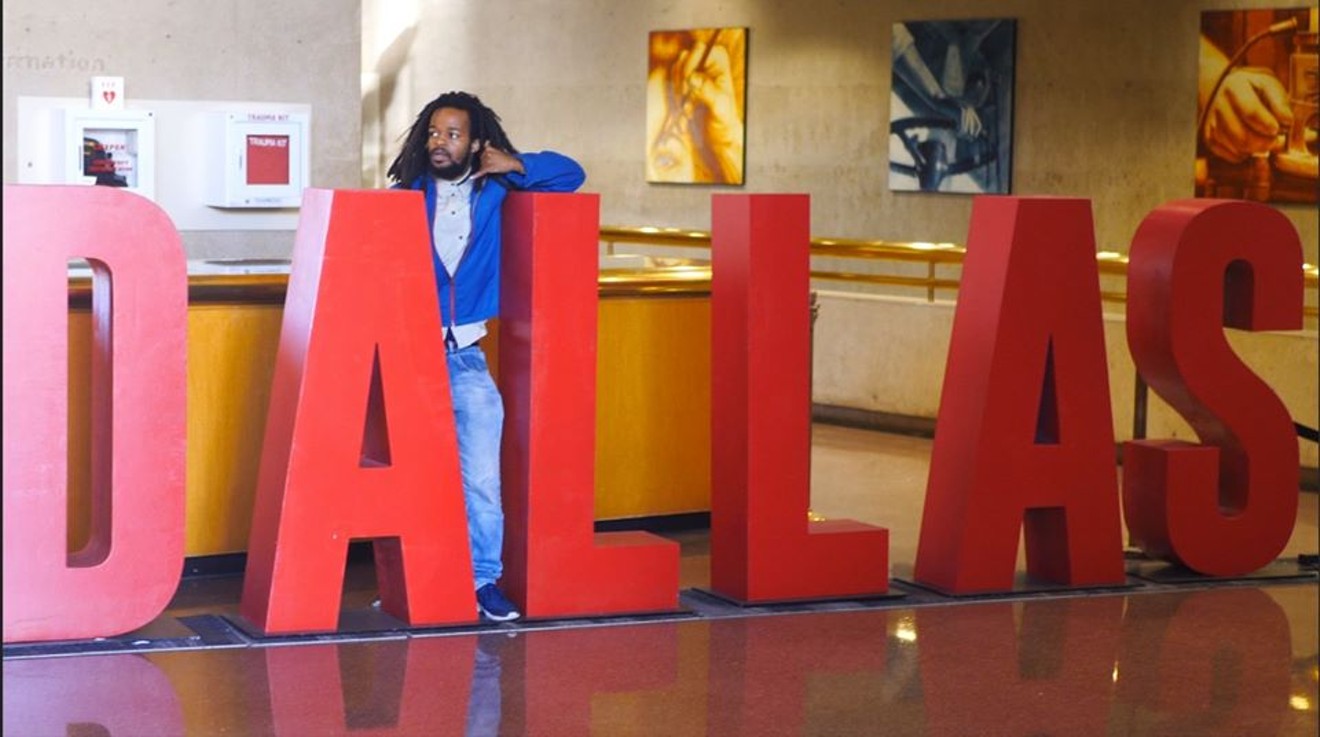For 72 hours, Davante Peters sat behind bars in the Arlington City Jail. Peters, along with eight others who are now known as the “Dallas 9,” was arrested on trespassing charges after a protest for Botham Jean outside AT&T Stadium last year. He was among about 75 others who turned out for the protest. Since then, he’s become a prominent face in the local protest movement, particularly in South Dallas.
For Peters, a local rapper, activism is an extension of his art.
“At one point in time, I didn’t know how to get into activism,” Peters says. “My method of activism was through my music.”
Peters is about 5-foot-6, with short, thick dreads and a beard that hangs just a few centimeters off his face. He lives in the Highland Hills community of South Dallas.
By night, Peters, with local activist groups Guerrilla Mainframe and Black Empowerment, patrols the apartment complex he stays at in an attempt to help eradicate crime that often rolls through the area. By day, he often stays pent up in his home creating music, turning hummed hooks and verses into songs that reflect African culture and his activism, released under the name Brotha SHAWT.
“My music is a way to bridge the gap between Africans and African Americans,” Peters says.
Peters has been a vocalist most of his life, he says. But it wasn’t until he took audio engineering classes at Cedar Valley College that he began playing instruments. Peters didn’t get a lot of hands-on experience in the classes until his third semester, he says, but being around people with similar musical interests helped him progress.
He began going out to Deep Ellum with his classmates, catching live performances of the music he wanted to play, Peters says.
“I got to actually see people in action playing instruments, and this is music that I listen to,” he says. “It wasn’t just like old folks doing this, but it was people that looked like myself.”“My music is a way to bridge the gap between Africans and African Americans.” — Brotha SHAWT
tweet this
In 2012, Peters started putting out songs on SoundCloud under the name TwoThrowed. Back then, he says, the music was mostly about “smoking and hustling.” His early tracks, like “Kush Smoke” and “I’m Floating” are more reminiscent of bling-era rap, and less mature than the music Peters writes today.
However, as he released more music and gained more fans, he became more immersed in the local activist community, which began to influence his writing. This marked a significant shift in Peters’ music.
He released “What Up Ankh?” in 2018, a track with all the makings of Brotha SHAWT’s current sound. He raps on top of a rumbling trap beat, with lyrics paying homage to his culture. The song name and hook refer to the ancient Egyptian hieroglyphic symbol ankh, which is commonly interpreted to be a symbol of life.
“We’re making ancient African culture relevant to today, because I think a lot of our situation in black America is that we don’t have an actual identity and we take other people’s identity,” Peters says.
The song was later re-released on his most recent album.
This year, in the midst of a run for Dallas City Council in District 3, Peters released his latest full-length, Blood In My Eye, and put on an event at The Free Man Cajun & Jazz Cafe called Trap the Vote. The event featured different local musical acts like Jett Rose and Anonymous, as well as speakers like Lee Merritt, Yafeuh Balogun and other candidates for City Council.
Peters organized Trap the Vote in an effort to engage the youth who have made for low voter turnout during local elections.
Blood In My Eye hit streaming platforms in March. The album is meant to be a soundtrack for the 1972 book of the same title by George Jackson, a black activist and author.
“[Jackson] is a real revolutionary cat that I get a lot of inspiration from,” Peters says.
The album starts with a spoken introduction from Rakem Balogun, the North Texas activist believed to be the first person labeled a “black identity extremist” by the FBI. The release is a mixture of Peters' songs and skits that feature activists Yafeuh and Rakem Balogun, as well as spoken word performances of Jackson's work by Robert Taylor.
These three activists, along with Peters, are members of Guerrilla Mainframe. In the track "GMF Yafeuh Balogun B.A.I.R Skit," Peters recounts one of the first protests he participated in with Guerrilla Mainframe.
The Bureau of American Islamic Relations (B.A.I.R), which has been deemed an anti-Muslim group by the ACLU, showed up in South Dallas for an armed protest outside of the Nation of Islam Muhammad Mosque #48. Members of Guerrilla Mainframe, local activist group Huey P. Newton Gun Club, as well as local factions of the Bloods and Crips came out to stand in solidarity with the mosque.
Ever since, Peters has had a hand in the fight for justice and equal rights in Dallas.
The activist has been awaiting his trial from the AT&T Stadium trespassing charge for over a year, but he says he won't let the incident slow him down. He continues to put out his art and organize discourse in his community.
Peters would like to run for City Council again someday.
"I'm gonna continue to do what I'm doing," he says. "I feel like they're trying to make an example out of us and deter people from protesting, but I'm gonna just use this as an opportunity to motivate people who might be scared or intimidated to keep going and to keep pushing."












